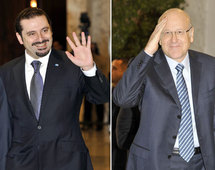
Thursday's vote capped three days of parliamentary talks on the government's political programme, which has triggered a heated debate between the majority and the opposition led by Hariri's son and political heir Saad Hariri.
Hariri did not attend Thursday's session.
Mikati's programme includes an ambiguously worded clause stipulating that Lebanon will "respect" international resolutions as long as they do not threaten peace and stability.
The opposition, however, has demanded that he state his government was "committed" to the UN-backed Special Tribunal for Lebanon (STL), which last week ordered the arrest of four Hezbollah members over the Hariri assassination.
In his speech to parliament, Mikati stated in no uncertain terms that his government would "continue to cooperate" with the Netherlands-based STL, which for years has been at the centre of an intractable political feud in Lebanon.
"The government confirms it will continue the path of the tribunal... and continue to cooperate in this regard as per UN Security Council Resolution 1757, which set up the tribunal in order to see justice served," Mikati said ahead of the vote.
"I am following my conscience, my ethics, my loyalty to (late) prime minister Rafiq Hariri," Mikati said when interrupted by a member of the opposition, prompting a round of applause from the audience.
While MPs of the rival Hezbollah- and Hariri-led blocs locked horns over issues including Hezbollah's arms and the unrest in Syria, the STL was the main point of contention in the three-day talks.
"Mr Mikati, you were silent when the state was seized by an armed group, when it split with international legitimacy and with demands for justice by so many Lebanese," said MP and former premier Fuad Siniora of the Hariri-led bloc.
"Rafiq Hariri votes no-confidence."
But MPs of Hezbollah's bloc slammed the STL as a farce and a ploy to guillotine the Syrian-allied movement.
"What we call international justice is one big lie," said Hezbollah MP Ali Fayyad.
Saad Hariri's Western-backed government collapsed on January 12 when the Hezbollah-led alliance pulled its ministers from cabinet after he refused to end all cooperation with the STL.
Najib Mikati, a Forbes-listed billionaire, was appointed prime minister on January 25, succeeding Hariri with the blessing of Hezbollah.
After five months of wrangling, the Sunni Muslim businessman announced the formation of a 30-seat government in which Hezbollah and its allies control 18 seats, including the key justice and telecommunications ministries.
Hezbollah leader Hassan Nasrallah has slammed the STL as a US-Israeli conspiracy and last week said he doubted the four Hezbollah members wanted by the court would ever be found.
Among the four is Mustafa Badreddine, brother-in-law of top Hezbollah commander Imad Mughniyeh, who was assassinated in a 2008 explosion in Damascus.
He is suspected of having masterminded the February 14, 2005 Beirut bombing that killed Hariri and 22 others.
---------------------------------------------------------------------------------
Hariri did not attend Thursday's session.
Mikati's programme includes an ambiguously worded clause stipulating that Lebanon will "respect" international resolutions as long as they do not threaten peace and stability.
The opposition, however, has demanded that he state his government was "committed" to the UN-backed Special Tribunal for Lebanon (STL), which last week ordered the arrest of four Hezbollah members over the Hariri assassination.
In his speech to parliament, Mikati stated in no uncertain terms that his government would "continue to cooperate" with the Netherlands-based STL, which for years has been at the centre of an intractable political feud in Lebanon.
"The government confirms it will continue the path of the tribunal... and continue to cooperate in this regard as per UN Security Council Resolution 1757, which set up the tribunal in order to see justice served," Mikati said ahead of the vote.
"I am following my conscience, my ethics, my loyalty to (late) prime minister Rafiq Hariri," Mikati said when interrupted by a member of the opposition, prompting a round of applause from the audience.
While MPs of the rival Hezbollah- and Hariri-led blocs locked horns over issues including Hezbollah's arms and the unrest in Syria, the STL was the main point of contention in the three-day talks.
"Mr Mikati, you were silent when the state was seized by an armed group, when it split with international legitimacy and with demands for justice by so many Lebanese," said MP and former premier Fuad Siniora of the Hariri-led bloc.
"Rafiq Hariri votes no-confidence."
But MPs of Hezbollah's bloc slammed the STL as a farce and a ploy to guillotine the Syrian-allied movement.
"What we call international justice is one big lie," said Hezbollah MP Ali Fayyad.
Saad Hariri's Western-backed government collapsed on January 12 when the Hezbollah-led alliance pulled its ministers from cabinet after he refused to end all cooperation with the STL.
Najib Mikati, a Forbes-listed billionaire, was appointed prime minister on January 25, succeeding Hariri with the blessing of Hezbollah.
After five months of wrangling, the Sunni Muslim businessman announced the formation of a 30-seat government in which Hezbollah and its allies control 18 seats, including the key justice and telecommunications ministries.
Hezbollah leader Hassan Nasrallah has slammed the STL as a US-Israeli conspiracy and last week said he doubted the four Hezbollah members wanted by the court would ever be found.
Among the four is Mustafa Badreddine, brother-in-law of top Hezbollah commander Imad Mughniyeh, who was assassinated in a 2008 explosion in Damascus.
He is suspected of having masterminded the February 14, 2005 Beirut bombing that killed Hariri and 22 others.
---------------------------------------------------------------------------------









 Home
Home Politics
Politics









